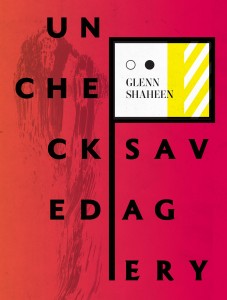76 pages, $10.00
Review by Matt Pincus
Glenn Shaheen’s collection of flash fiction is a bitter, sardonic reminder of America’s abstract fears and paranoia of “other.” The stories are distinctly American through cultural tropes (in the first story, “Harry Loves Every Movie,” Crash, Hostel 2 and Failure to Launch are mentioned): Movies, songs, brand name stores, corporate gimmicks and overly dramatized clichés become patterned, dry jokes on tragic ironies in American personas.
The story “Personal Order” takes on the corporate marketing of deodorant, and distorts what is usually a pleasant aroma into the smell of McDonald’s grease. But the narrator says, “People just started coming closer, being more and more curious about my smell. I felt like I was always mobbed.” Although he is getting a desired social response, the smell of his deodorant carries a repulsive cultural history and also an individual, psychosomatic response. The tragic waste of consumer culture is nauseated, but still driven back to consumerism.
“Swordfight” is the story of a teacher’s meditation on a student’s comment (after a screening of Polanski’s Macbeth) about how swordfights are more technically virtuous in Pirates of the Caribbean. The valley girl’s criticism leads into the narrator’s own relationship, the happy distance between his lover and the same MGM’s greatest romances DVD collection they bought each other for their anniversary. A romantic, unconditional love is filled in by objects, which each individual knows are not enough to fill happiness in their lives.
Most of the tales are poignant reminders of deep infrastructural, visceral issues existing among American social groups. In many senses, Shaheen seems to be saying that the large bubble, or majority of America, exists with these fears and paranoia under a surface of abrasive, almost violent tension. I’m not sure, though, if this is all he wants the stories to say, or if he wishes they could’ve said more.
The best fiction, whether it be flash, short story, or novel, is always able to delve into subtle subjectivities of character, but these stories and sentences seem too bare, or rather too short, to carry a sense of how Shaheen’s protagonists live with these fears and how one can attempt to perceive and rationalize their human character.
“Heart of Glass” centers around a man who gives his friends their own personalized ringtones, another comment directed back to consumer economics. The ringtone given to his girlfriend is not his favorite song though, which comes as a revelation to her, and thus ruins their relationship. The last metaphor in this story comes back to the narrator watching a food show, comparing the “delicate and precarious” flan to his love affair. In essence, the acerbic or supposedly humorous commentary on consumer culture – reducing human beauty, emotion, body to personalized ringtones – is flattened by a volta of a cheap literary metaphor of food given with no narrative or historical context of the character.
I like flash fiction, but in Unchecked Savagery the flash is almost too short, and I leave each little vignette wanting a broader panorama of America; I want to see where each tale might intersect, and how each character is woven into the lives of a fabric, patchwork, a country.
***
Matt Pincus was born and raised in San Diego, CA. He holds B.A. in English and World Literature at Pitzer College and is an M.F.A. student at Naropa University’s Jack Kerouac School. He has written reviews for Bookslut, Necessary Fiction, RainTaxi, and the Volta 365 Blog.
![[PANK]](http://pankmagazine.com/wp-content/themes/pank/assets/images/pank-logo-large.png)

